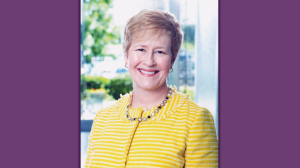Turning a Terrifying Ordeal into an Opportunity to Help
Before Claire Aldridge, PhD’96, and her husband, Matt Burnside, took their daughter on a long-planned spring break trip to New York City, she checked travel guidelines issued by the Centers for Disease Control and Prevention and by the University of Texas Southwestern Medical Center, where she is associate vice president of commercialization and business development. The focus at the time was on surface transmission of the novel coronavirus: avoid touching doorknobs, wash your hands frequently, and don’t touch your face.
That sounded manageable. So, “washing our hands like crazy,” Aldridge and her family took off as planned from Dallas/Fort Worth International Airport. It was March 11, 2020.
“If our flight had been even two hours later, we probably wouldn’t have gone,” says Aldridge, who earned her doctorate in immunology and genetics at the Duke University School of Medicine. “Because while we were in the air, everything changed. The world we landed in was very different than the one we took off from.”
‘AM I GOING TO DIE?’
That day, in a dizzying cascade of events, the World Health Organization declared the COVID-19 outbreak a pandemic; President Trump announced a ban on travel from Europe; actor Tom Hanks announced that he and his wife, Rita Wilson, had tested positive; and the NBA and numerous college conference basketball tournaments abruptly suspended competition.
Having arrived in New York, Aldridge and her family—avoiding the subway and sanitizing their hands until they were raw—decided to escape the news barrage and go ahead to the Broadway musical they had booked seats for, a musical adaptation of Mean Girls.
They had tickets for another show the next night as well, but that day Broadway shut down. Stranded in a suddenly shuttered city, the family got an earlier flight and returned to Texas.
“We thought we were being so careful, and we were only there for 36 hours,” Aldridge says. “But that was enough.”
Two days later, Matt and their daughter, Lucy, fell ill. Aldridge herself came down with symptoms two days after that. Tests confirmed their fears: all three had COVID-19.
They—Aldridge and Matt especially—suffered debilitating body aches, crushing headaches, and overwhelming fatigue. Both lost their sense of taste and smell.
“It was among the worst I’ve ever felt, and you keep waiting and wondering whether it's going to get worse,” says Aldridge. “There were definitely times where I thought, ‘Am I going to die? Is my husband going to die? Did we unwittingly kill anybody?’ With hindsight, I think our infections ended with us, because we quarantined as soon as we got home. And now that we’re done with it, we’re probably the safest people you know.”
CHANGING LIVES
Aldridge was born in England and moved with her family to north Texas when she four years old; “My parents are British and I’m Texan,” she says. Always interested in science, she became fascinated by molecular genetics as an undergraduate at Texas A&M University. She intended to go to graduate school in California, but her senior research advisor suggested either the University of Wisconsin or Duke.
“I visited Duke, and it was the most beautiful place I’d ever seen,” she says. “The people were authentic and friendly. The tulips and trees were in bloom. You were two hours from the beach and two hours from the mountains. In Texas, you drive five hours just to get to the grocery store. I fell in love with Duke.”
In 1996, the year she earned her PhD, her father was diagnosed with metastatic melanoma and given two years to live. Aldridge moved back to Texas to be with him, intending eventually to return to North Carolina. Twenty-five years later, she’s still in Texas and her father is still alive and well, having responded extraordinarily well to a clinical trial involving interferon gamma.
Her father’s experience helped shape Aldridge’s career. At UT Southwestern, she helps shepherd laboratory discoveries into therapies for clinical use.
“I didn’t want to do bench science, but I did want to be a part of giving people more time with their dad, or their spouse or sibling,” Aldridge says. “Somebody else can do the science. My role is to figure out how to get the science into the marketplace where it can change people’s lives.”
Now Aldridge is trying to help change lives for people with COVID-19. As recovered individuals, she and Matt are reservoirs of COVID-19-specific antibodies, the proteins that help fight infection and confer post-exposure immunity. They regularly donate their antibody-rich plasma, which can then be administered to patients with COVID-19. Although the effectiveness of convalescent plasma isn’t definitively known, the FDA has approved its use as a therapy that may help lessen the severity and/or duration of COVID-19.
“One thing this has shown me is that we are all part of a community, and everybody has a role to play,” Aldridge says. “Sometimes your role is something nobody else can do. We can donate plasma, so we donate plasma. And we do grocery shopping and other things for some people we know who are more vulnerable than we are. We’re doing what we can to take something negative and turn it into something positive.”



